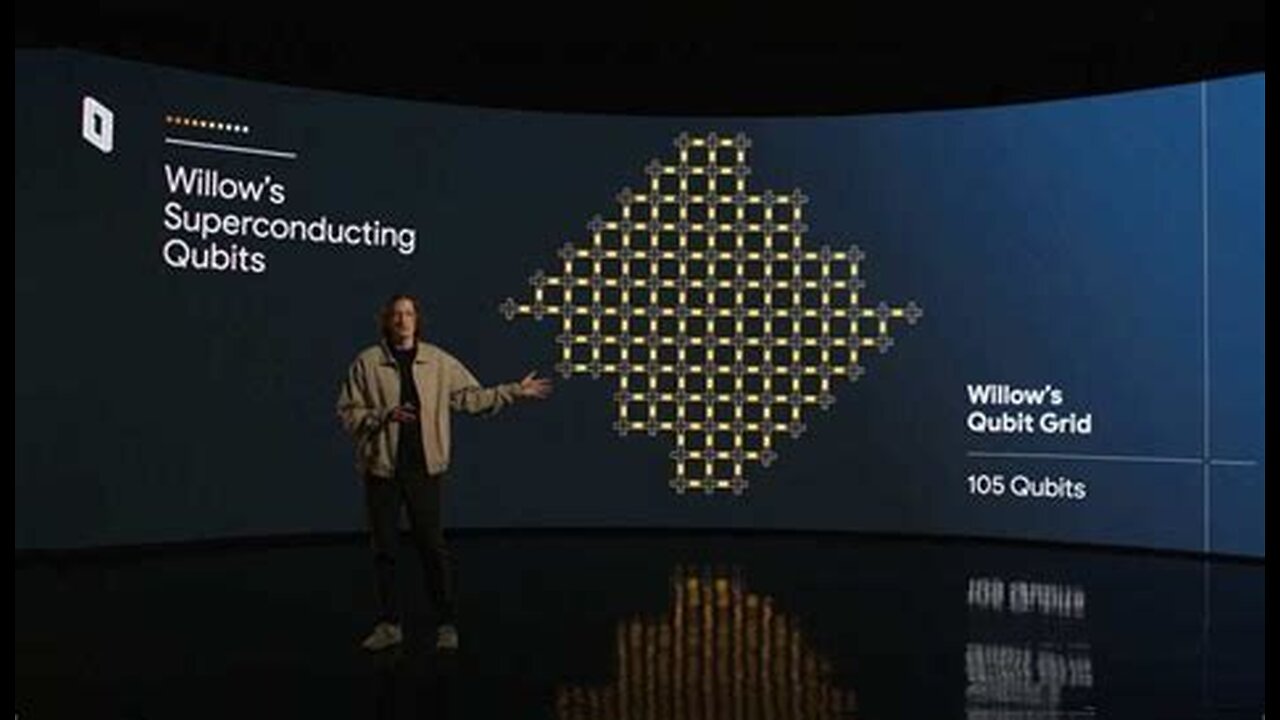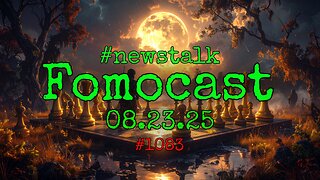Premium Only Content

Quantum Computing: Humanity’s Portal to the Infinite
Quantum computing, with its promise to transcend the limitations of classical systems, is no longer a dream confined to theoretical physics or speculative fiction. Google’s Willow chip, capable of calculations so complex they would take classical supercomputers billions of years to complete, signals the dawn of a quantum age. But beyond its technical achievements, the rise of quantum computing opens the door to profound shifts in how humanity understands and interacts with the fabric of reality itself.
What happens when we perfect this technology? What will a world look like where quantum computers are as ubiquitous as smartphones, reshaping not just industries but our collective identity, morality, and vision of existence?
Quantum Computing: A New Paradigm of Reality
At its core, quantum computing represents a fundamental departure from the binary logic of classical machines. Qubits, leveraging the principles of superposition and entanglement, allow for computations that are probabilistic and multidimensional, reflecting the inherent complexity of the universe.
• Superposition as a Lens: Qubits existing in multiple states at once challenge the notion of binary opposites, offering a more nuanced framework for decision-making and problem-solving.
• Entanglement as Interconnection: The phenomenon where qubits remain linked regardless of distance echoes a deeper truth about the interconnected nature of reality, suggesting that everything is part of a larger, unified system.
The Quantum Future: A World Transformed
Perfected quantum computing will revolutionize every facet of human life, transforming not only how we solve problems but how we define them. Here are glimpses into this quantum future:
Revolutionizing Human Creativity
Quantum computing will empower humanity to engage with problems and possibilities in ways never before imaginable:
• Quantum Art and Music: Algorithms will explore creative spaces beyond human intuition, composing symphonies and generating visual art that resonate on levels yet to be discovered.
• Designing New Realities: Architects and engineers could simulate and create entire ecosystems optimized for harmony, efficiency, and beauty, fostering sustainable urban environments.
The Quantum Biology Revolution
Quantum simulations will revolutionize our understanding of life itself:
• Curing the Incurable: Diseases that elude modern medicine will become solvable puzzles. Quantum models will map the molecular processes of cells, identifying treatments tailored to each individual.
• Extending Human Potential: Enhanced understanding of biological processes could lead to breakthroughs in longevity, resilience, and the optimization of human health.
Energy and Resource Abundance
Quantum computers will enable breakthroughs in energy efficiency and sustainability:
• Clean Energy for All: Simulations will optimize energy generation and storage systems, potentially unlocking new forms of renewable energy far beyond current technologies.
• Resource Optimization: Supply chains and resource allocation could become flawless, ensuring equitable distribution of essentials like food, water, and medicine.
Beyond Linear Time
Quantum computing will challenge humanity’s perception of time itself:
• Temporal Simulations: By modeling future scenarios with unprecedented accuracy, governments and corporations could predict the outcomes of decisions decades ahead, reshaping planning and policy-making.
• Parallel Histories: Quantum simulations could reconstruct alternate historical outcomes, offering humanity new perspectives on its past and the lessons it holds for the future.
Philosophical Shifts in a Quantum World
The implications of quantum computing extend beyond technology into the realm of philosophy, challenging humanity’s most fundamental assumptions.
Reality as a Continuum
The probabilistic nature of quantum systems suggests that reality is not a fixed state but a spectrum of possibilities. This invites humanity to:
• Rethink Certainty: Embrace ambiguity and complexity as central to existence rather than seeking binary answers.
• Explore Alternative Narratives: Recognize that every decision creates ripples across a continuum of outcomes, fostering a deeper sense of responsibility.
Information as the Essence of Being
If quantum systems operate on the manipulation of information, then information itself may be the fundamental building block of existence. This shifts our understanding of:
• Identity: Humans might be seen not as isolated entities but as nodes within a vast informational network.
• Meaning: Purpose and connection could derive from the role each individual plays in the broader web of existence.
Challenges of the Quantum Era
The quantum leap is not without its perils. As with any transformative technology, quantum computing brings ethical, societal, and existential challenges.
Ethical Entanglements
Quantum computing raises questions about the morality of unprecedented power:
• Simulating Sentience: If quantum systems simulate entities with consciousness-like attributes, do those entities have rights? What ethical obligations do we owe to simulated beings?
• Predictive Overreach: Governments could misuse quantum simulations to enforce preemptive laws or control populations based on predicted behaviors, creating a surveillance state with unparalleled power.
Economic Disruption
Quantum efficiency could destabilize traditional systems:
• Redundant Industries: Fields like classical computing, logistics, and traditional engineering could become obsolete overnight, displacing millions of workers.
• The Quantum Divide: Access to quantum technology might create a chasm between those who control it and those left behind, exacerbating existing inequalities.
Existential Questions
As quantum computing redefines reality, humanity must grapple with profound questions:
• Do We Matter? If reality is one of infinite possibilities, what significance does this timeline hold? How do we anchor ourselves in a sea of potentialities?
• Are We Creators or Observers? With the ability to simulate and shape realities, humanity must confront its role as both participant and creator in the cosmic narrative.
A Vision for Responsible Quantum Advancement
To harness the potential of quantum computing responsibly, humanity must embrace new frameworks for governance, collaboration, and ethics.
The Quantum Commons
Quantum technology must be treated as a shared resource, not a tool of domination:
• Equitable Access: Open-source platforms and international collaboration can prevent monopolization by powerful corporations or nations.
• Quantum Education: Preparing future generations to navigate a quantum world is essential for ensuring inclusive innovation.
New Ethical Paradigms
Quantum realities demand an evolution of ethics:
• Interconnected Morality: Recognizing the interconnectedness of existence can inspire policies and behaviors that prioritize collective well-being over individual gain.
• Simulated Consciousness Rights: International agreements must address the ethical treatment of potentially sentient simulations.
Conclusion: The Infinite Horizon
The advent of quantum computing is not just a technological revolution—it is a gateway to a new phase of human existence. It invites us to see ourselves as participants in a vast, interconnected system of probabilities and possibilities, where every action resonates across the continuum of existence.
In this quantum future, the lines between creator and creation, observer and participant, will blur. Humanity will have the tools to reshape its destiny, but with this power comes a profound responsibility to act with wisdom, empathy, and foresight.
As we stand on the threshold of the quantum age, the question is no longer just what we can achieve with this technology—it is who we will become in the process. The universe, in all its complexity and wonder, awaits our answer.
-
 6:34
6:34
FragmentsOfTruth
2 days ago⤇ THE NUCLEAR HOAX: A Grand Illusion of Power, Fear, and Control
2571 -
 6:34:50
6:34:50
SpartakusLIVE
11 hours ago#1 Saturday Spartoons on RUMBLE PREMIUM
113K7 -
 1:04:59
1:04:59
Man in America
12 hours ago“Summoning the Demon” — The AI Agenda Is FAR WORSE Than We Know w/ Kay Rubacek
50.5K36 -
 2:16:48
2:16:48
Tundra Tactical
10 hours ago $0.11 earned🎯💥 The World’s Okayest Gun Show 🔫😂 | LIVE Tonight on Rumble!
31.3K -
 3:36:03
3:36:03
Mally_Mouse
1 day ago🌶️ 🥵Spicy BITE Saturday!! 🥵🌶️- Let's Play: Tower Unite!
57.1K2 -
 58:59
58:59
MattMorseTV
10 hours ago $1.61 earned🔴Trump just BROKE Newsom.🔴
73.1K85 -
 18:14
18:14
Her Patriot Voice
10 hours agoWho Is WORSE for NYC: Trump Girl or Socialist?
55K34 -
 3:39:42
3:39:42
SavageJayGatsby
9 hours agoSpicy Saturday with Mally! | Road to 100 | $300 Weekly Goal for Spicy Bites!
51.7K1 -
 3:35:50
3:35:50
FomoTV
11 hours ago🚨 Swamp Theater: FBI Raids Bolton 🕵 Still NO Epstein Files, Trump's Troops & the Red Heifer Hoax 🐂 | Fomocast 08.23.25
23.9K7 -
 6:04:40
6:04:40
Akademiks
14 hours agoRoc Nation & Meg Thee Stallion did a 7 HOUR Deposition with me. Drake Secret Kid Finally Revealed.
60K3